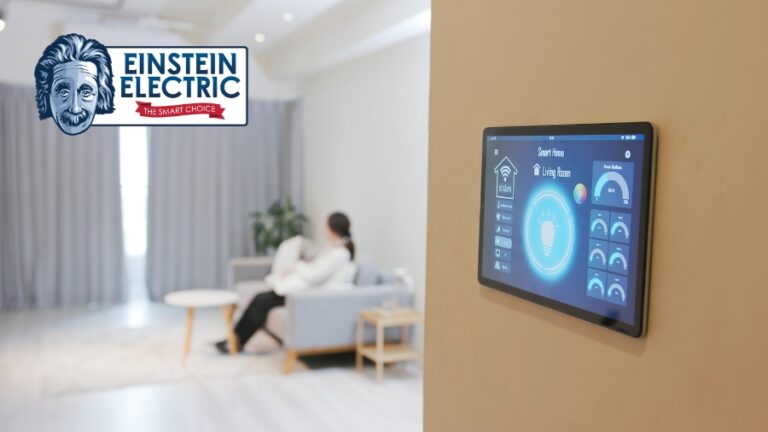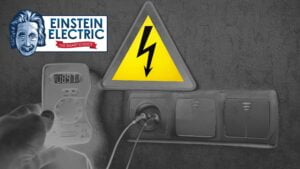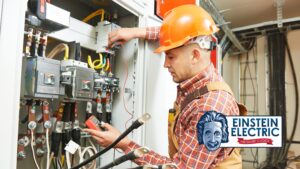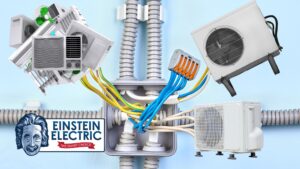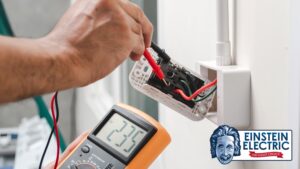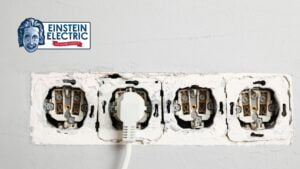The electrical system is an essential component of every home, providing power to appliances and devices we use every day. However, many homeowners neglect their electrical systems, assuming that as long as the lights turn on and the outlets work, everything is fine. But the truth is that older electrical systems may not be equipped to handle the demands of modern living, and upgrading your home’s electrical system can provide many benefits. In this blog, we will explore the benefits of upgrading your home’s electrical system.
- Improved Safety
Safety is the primary concern when it comes to electrical systems. Older homes may have outdated wiring, which can be a fire hazard, especially if overloaded. Upgrading your electrical system ensures that your home is up to code and that all components are safe and functioning correctly. You can also add safety features such as ground fault circuit interrupters (GFCIs) and arc fault circuit interrupters (AFCIs), which can prevent electrical fires and shock hazards.
Here are some ways in which an upgrade can improve safety:
- Updated Wiring: Older homes may have outdated wiring that doesn’t meet current safety standards. Upgrading the wiring ensures that it is properly insulated and can handle the electrical load without overheating or causing a fire hazard.
- Compliance with Electrical Codes: Electrical codes are regularly updated to enhance safety standards. By upgrading your electrical system, you ensure that your home meets the latest electrical codes and regulations, reducing the risk of potential hazards.
- Overload Prevention: Overloading circuits can lead to overheating and electrical fires. Upgrading your electrical system allows for the installation of additional circuits, reducing the likelihood of overloading and ensuring that each circuit is properly sized for its intended use.
- Ground Fault Circuit Interrupters (GFCIs): GFCIs are electrical devices that protect against electrical shock hazards. They monitor the flow of electricity and can quickly shut off power to the circuit if they detect a ground fault, such as current leakage due to damaged wiring or faulty appliances. Installing GFCIs in areas prone to moisture, such as bathrooms, kitchens, and outdoor outlets, significantly reduces the risk of electrical shock.
- Arc Fault Circuit Interrupters (AFCIs): AFCIs are designed to detect and prevent electrical fires caused by arcing faults, which can occur when damaged or deteriorated wiring creates sparks. AFCIs monitor the circuit for abnormal arcing and immediately cut off power if detected, minimizing the risk of fire.
- Updated Electrical Panel: The electrical panel is the heart of your home’s electrical system. Upgrading to a modern panel provides enhanced safety features such as better circuit protection, improved overload management, and compatibility with safety devices like GFCIs and AFCIs.
- Surge Protection: Power surges can damage electrical appliances and pose a fire risk. Upgrading your electrical system allows for the installation of surge protectors, which safeguard your devices by diverting excess voltage and preventing damage.
By incorporating these safety features and ensuring your electrical system is up to date, you can significantly reduce the risk of electrical fires, shocks, and other hazards in your home. It’s always recommended to consult a licensed electrician to assess your specific needs and carry out the necessary upgrades safely and efficiently.
- Increased Capacity
Modern life demands more power than ever before. Homeowners use more electronics and appliances than ever, which can put a strain on older electrical systems. Upgrading your electrical system can increase your home’s capacity to handle the power demands of modern living, ensuring that you have enough power for all your devices and appliances.
Here’s how upgrading your electrical system can address the increased power demands:
- Sufficient Outlets: Older homes may have limited outlets, which can lead to overloaded circuits and the use of extension cords, which can be unsafe. Upgrading your electrical system allows for the installation of additional outlets in convenient locations throughout your home, providing adequate access to power for all your devices without the need for excessive extension cords or power strips.
- Upgraded Service Panel: The service panel, also known as the electrical panel or circuit breaker panel, is responsible for distributing electricity throughout your home. Older panels may have lower amp capacities, such as 100 or 150 amps, which may not be sufficient for today’s power demands. Upgrading to a higher amp capacity panel, such as 200 amps, ensures that your electrical system can handle the increased load without tripping breakers or causing electrical issues.
- Additional Circuits: An electrical system upgrade allows for the installation of additional circuits to accommodate the power requirements of new appliances and electronics. This prevents overloading of existing circuits, reduces the risk of electrical fires, and ensures that each circuit is properly sized for its intended use.
- Dedicated Circuits: Certain high-power appliances, such as electric stoves, air conditioners, and electric car chargers, require dedicated circuits to operate safely and efficiently. Upgrading your electrical system allows for the installation of dedicated circuits for these appliances, ensuring that they have the necessary power supply without overloading other circuits.
- Upgraded Wiring: Upgrading your electrical system often involves replacing outdated wiring with modern, higher-capacity wiring. This ensures that the electrical infrastructure in your home can handle the increased power demands without overheating or causing safety hazards.
By upgrading your electrical system to increase capacity, you can meet the power demands of modern living and avoid electrical issues such as frequent circuit tripping, dimming lights, or insufficient power supply to your appliances and devices. Remember to consult a licensed electrician to assess your specific needs and ensure a safe and proper upgrade of your electrical system.
- Energy Efficiency
An upgraded electrical system can also lead to energy efficiency. Older homes may have outdated electrical components that are not energy efficient, such as incandescent light bulbs, which consume more energy and produce more heat. Upgrading to LED lights and other energy-efficient appliances can reduce your energy bill and minimize your carbon footprint.
Here’s how an upgraded electrical system can help you save energy and reduce your carbon footprint:
- LED Lighting: Older homes often have traditional incandescent light bulbs, which are highly inefficient and consume more energy while generating significant heat. Upgrading to LED (light-emitting diode) lighting is a cost-effective and energy-efficient solution. LED bulbs use significantly less energy, last longer, and produce less heat while providing the same level of brightness. By replacing incandescent bulbs with LEDs throughout your home, you can significantly reduce your energy consumption for lighting.
- Energy-Efficient Appliances: Upgrading your electrical system often goes hand in hand with upgrading your appliances. When replacing older appliances, consider choosing energy-efficient models that bear the ENERGY STAR label. ENERGY STAR-certified appliances, such as refrigerators, dishwashers, washing machines, and air conditioners, meet strict energy efficiency standards, consuming less electricity while still delivering high performance. These appliances often have advanced features like smart controls and sensors that optimize energy usage.
- Smart Home Technology: An upgraded electrical system can support the integration of smart home technology, enabling you to monitor and control your energy consumption more effectively. Smart thermostats, for example, allow you to program and remotely adjust your home’s temperature, optimizing energy usage based on your schedule and preferences. Smart power strips and outlets can also help manage energy consumption by cutting off power to devices in standby mode.
- Energy Monitoring Systems: Upgrading your electrical system may include the installation of energy monitoring systems. These systems provide real-time data on your energy consumption, allowing you to identify areas of high energy usage and make informed decisions to reduce wastage. By understanding how and when you consume energy, you can make adjustments to optimize efficiency.
- Power Factor Correction: Power factor correction is a technique used to reduce energy wastage caused by inefficient use of electricity in certain types of equipment. Upgrading your electrical system can include the installation of power factor correction devices, which improve the efficiency of electrical equipment and reduce energy losses.
By incorporating energy-efficient lighting, appliances, and smart technologies into your upgraded electrical system, you can significantly reduce your energy consumption, lower your utility bills, and contribute to environmental sustainability by reducing your carbon footprint. Additionally, consult with a licensed electrician to ensure that the installation and integration of energy-efficient components are done correctly and safely.
- Smart Home Integration
Modern electrical systems are also equipped with smart home technology, which can make your life easier and more convenient. Smart home technology allows you to control your home’s lighting, temperature, and security from your smartphone, tablet, or computer. You can also program your appliances and devices to turn off automatically when not in use, saving energy and reducing your carbon footprint.
Here’s how smart home technology can enhance your electrical system:
- Lighting Control: Smart lighting systems allow you to control and automate your home’s lighting from anywhere using your smartphone or other smart devices. You can remotely turn lights on or off, adjust brightness levels, and even create schedules or routines to automatically control lighting based on your preferences or occupancy patterns. This convenience not only adds comfort but also helps save energy by ensuring that lights are only used when needed.
- Energy Management: Smart home technology enables you to monitor and manage your energy consumption more effectively. With energy monitoring systems and smart meters, you can track your energy usage in real-time and gain insights into where you can optimize and reduce wastage. By identifying energy-hungry appliances or areas of high consumption, you can make informed decisions to save energy and reduce your utility bills.
- HVAC Control: Smart thermostats allow you to control your home’s heating, ventilation, and air conditioning (HVAC) system remotely. You can adjust temperature settings, create schedules, and even use geofencing to ensure that your home is at an optimal temperature when you arrive. Smart thermostats can learn your preferences and adjust settings automatically to maximize comfort and energy efficiency.
- Appliance Automation: Smart plugs and outlets enable you to automate and control the operation of various appliances and devices. You can remotely turn them on or off, create schedules, or even set up conditional triggers. For example, you can program your coffee maker to start brewing when your morning alarm goes off or have your smart TV turn off automatically after a certain period of inactivity. This automation not only adds convenience but also helps save energy by ensuring that devices are not left on unnecessarily.
- Enhanced Security: Smart home technology integrates with security systems, allowing you to monitor and control various aspects of your home’s security remotely. You can receive notifications and video feeds from security cameras, lock or unlock doors, and even simulate occupancy when you’re away by controlling lights and other devices. This provides peace of mind and enhances the overall safety of your home.
- Voice Control: Many smart home systems are compatible with voice assistants such as Amazon Alexa, Google Assistant, or Apple Siri. This allows you to control your electrical devices and systems using voice commands, providing a hands-free and convenient way to interact with your smart home.
By integrating smart home technology into your electrical system, you can enjoy the convenience of remote control, automation, energy management, and enhanced security. It’s important to ensure that your electrical system is properly set up and compatible with the smart home devices and platforms you choose, so consulting with a licensed electrician and following manufacturer guidelines is recommended.
- Increased Home Value
Upgrading your home’s electrical system can also increase its value. If you plan to sell your home in the future, a modern electrical system can be a significant selling point for potential buyers. Buyers are often willing to pay more for a home that has a modern, upgraded electrical system.
Here’s how an upgraded electrical system can contribute to the increased value of your home:
- Safety and Compliance: An upgraded electrical system ensures that your home meets current safety standards and electrical codes. This is a significant selling point for buyers as it provides assurance that the electrical system is safe, reliable, and up to date. Buyers are often willing to pay more for a home that has a properly upgraded and code-compliant electrical system, as it reduces the risk of electrical hazards and the need for immediate costly repairs or upgrades.
- Modern Convenience: Upgraded electrical systems often come with smart home technology integration, allowing for remote control, automation, and energy management. These modern conveniences can be appealing to potential buyers who value the ability to control their home’s electrical systems, lighting, temperature, and security from their smartphones or other smart devices. The presence of such advanced features can increase the perceived value of your home.
- Increased Capacity: As mentioned earlier, upgrading your electrical system increases its capacity to handle the power demands of modern living. This means that buyers can confidently use multiple electronics, appliances, and devices simultaneously without worrying about circuit overloads or electrical issues. The increased capacity and availability of dedicated circuits for high-power appliances, such as electric vehicle chargers or home theater systems, can be a selling point for buyers who have specific power requirements.
- Energy Efficiency: An upgraded electrical system often goes hand in hand with energy-efficient lighting, appliances, and smart home technology. These energy-saving features can attract buyers who are conscious of their environmental impact and utility costs. Energy-efficient homes are increasingly desirable, and buyers may be willing to pay a premium for a home that already incorporates energy-efficient electrical systems and appliances.
- Future-Proofing: By upgrading your electrical system, you’re future-proofing your home to some extent. Buyers appreciate knowing that the electrical infrastructure of the home has been recently updated, reducing the need for immediate electrical renovations or upgrades. This peace of mind can make your home more appealing and potentially increase its value.
It’s important to note that the extent to which an upgraded electrical system increases the value of your home can vary depending on various factors, including the local real estate market, buyer preferences, and overall condition of your home. It’s always a good idea to consult with a real estate professional to assess the potential impact on your home’s value based on your specific market conditions.
- Better Functionality
Upgrading your electrical system can also improve the functionality of your home. You can add outlets in convenient locations, such as in the kitchen or home office, making it easier to use your devices and appliances. You can also upgrade your electrical panel to handle the power demands of new appliances, such as electric cars or home charging stations.
Here’s how an upgraded electrical system enhances functionality:
- Additional Outlets: Upgrading your electrical system allows for the installation of additional outlets in strategic locations throughout your home. You can have outlets added in areas where you need them the most, such as the kitchen, home office, or entertainment areas. This provides greater convenience and eliminates the need for excessive use of extension cords or power strips, making it easier to use your devices and appliances without limitations.
- Convenient Charging Stations: With the increasing popularity of electric vehicles (EVs), having the ability to charge your car at home is becoming more important. Upgrading your electrical system can include the installation of dedicated circuits and charging stations for EVs, making it convenient and efficient to charge your vehicle at home. This eliminates the need to rely solely on public charging stations and adds a valuable feature to your home.
- Dedicated Circuits for High-Power Appliances: Upgrading your electrical system allows for the installation of dedicated circuits for high-power appliances such as electric stoves, ovens, air conditioners, or home theater systems. This ensures that these appliances have their own dedicated power supply without overloading other circuits, providing optimal functionality and performance.
- Enhanced Power Handling: Older electrical systems may not be able to handle the power demands of modern appliances and devices. Upgrading your electrical panel to a higher amp capacity allows for the safe and efficient operation of new appliances and electronics. This ensures that your electrical system can handle the power requirements without tripping breakers or causing electrical issues, providing better functionality overall.
- Integration of Smart Home Technology: Upgrading your electrical system often goes hand in hand with the integration of smart home technology. This allows you to control and automate various aspects of your home, such as lighting, temperature, security, and entertainment systems. With smart home technology, you can create customized settings and routines that enhance the functionality and convenience of your home, making it easier to manage and enjoy.
By upgrading your electrical system, you can customize the functionality of your home to meet your specific needs and enhance your daily living experience. It’s important to work with a licensed electrician to ensure that the upgrades are properly planned, installed, and meet all safety regulations and codes.
- Avoid Costly Repairs
An outdated electrical system can be a ticking time bomb, waiting to fail at the most inconvenient time. A modern electrical system is more reliable and less prone to failure, ensuring that you have power when you need it.
Upgrading your electrical system can help you avoid costly repairs and unexpected downtime. Here’s how upgrading your electrical system can contribute to avoiding such issues:
- Enhanced Safety: An outdated electrical system can pose safety risks, including electrical fires, shocks, and other hazards. By upgrading your electrical system, you ensure that it meets current safety standards and codes. This reduces the risk of electrical failures, short circuits, and other issues that could lead to costly repairs or damage to your property.
- Preventive Maintenance: Upgrading your electrical system often involves inspecting and replacing outdated or faulty components. This proactive approach helps identify potential issues before they turn into major problems. By addressing these issues during the upgrade process, you can avoid future breakdowns or malfunctions, minimizing the need for costly repairs down the line.
- Improved Reliability: Upgrading to a modern electrical system provides increased reliability. New wiring, circuit breakers, outlets, and other components are less prone to failures and malfunctions. This ensures that you have a consistent and reliable power supply, reducing the chances of unexpected downtime and the need for emergency repairs.
- Load Management: Older electrical systems may not be designed to handle the power demands of modern living. Upgrading your electrical system allows for load management, ensuring that circuits are properly sized and distributed to handle the electrical load without overloading. This prevents overheating, tripped breakers, and other issues that can lead to costly repairs or interruptions in power supply.
- Long-Term Cost Savings: While upgrading your electrical system may involve upfront costs, it can result in long-term cost savings. By investing in a modern and efficient electrical system, you can reduce energy waste, lower utility bills, and avoid expensive repairs or replacements that may be required with an outdated system. Additionally, regular maintenance and inspections of the upgraded electrical system can help identify potential issues early on, preventing them from becoming more costly problems.
By upgrading your electrical system, you can proactively address potential issues, improve reliability, and reduce the risk of costly repairs or downtime. It’s recommended to consult with a licensed electrician to assess the condition of your existing system and determine the most appropriate upgrade options for your specific needs and budget.
In conclusion, upgrading your home’s electrical system can provide many benefits, including improved safety, increased capacity, energy efficiency, smart home integration, increased home value, better functionality, and avoiding costly repairs. Upgrading your electrical system is a worthwhile investment that can pay off in the long run, both financially and in terms of convenience and peace of mind. So, if you haven’t already done so, consider upgrading your home’s electrical system today.

